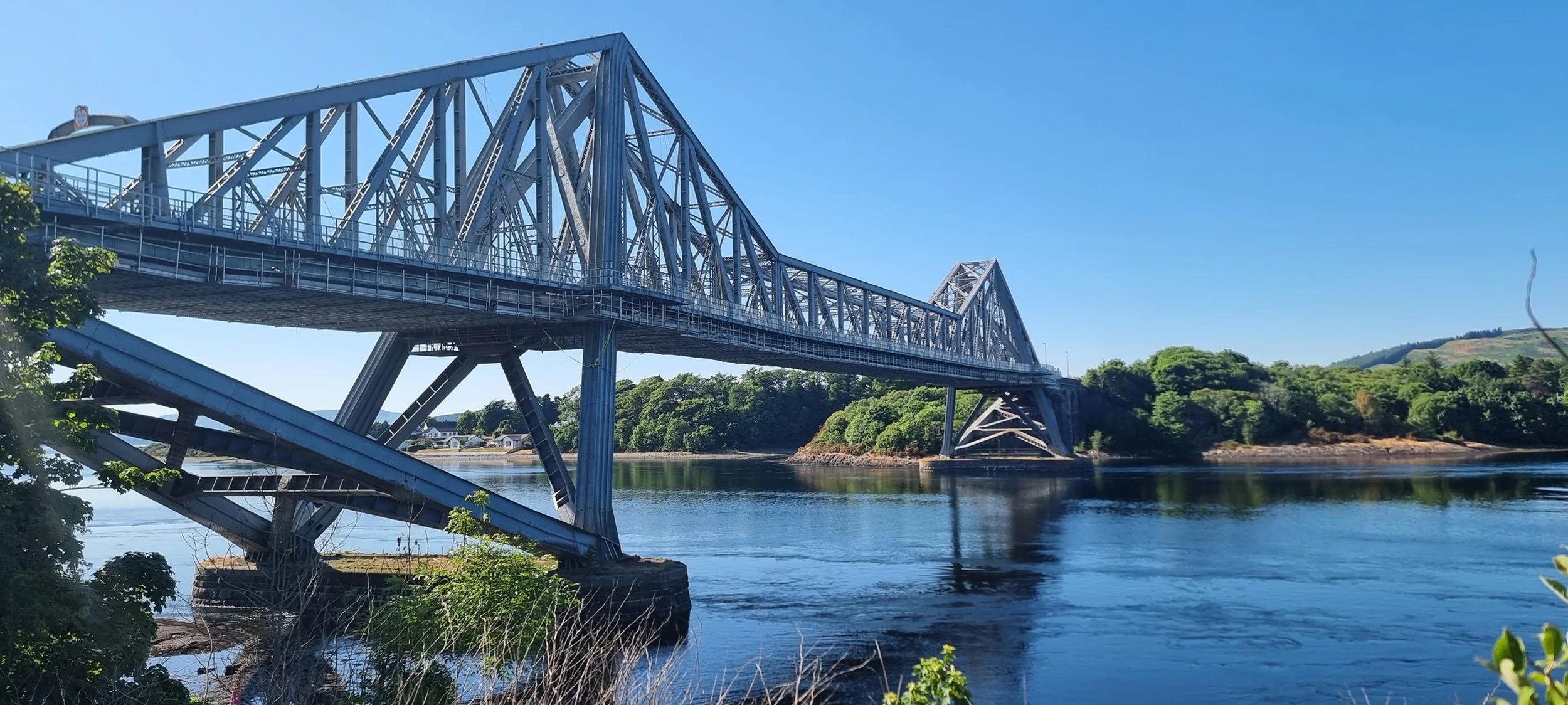Spencer Group completes bespoke walkway on iconic Scottish bridge
NEW WALKWAY: Connel Bridge, which spans Loch Etive
By Rick Lyon
Heritage bridge works specialist Spencer Group has completed a complex and unique temporary walkway on an iconic Scottish bridge ahead of major work to replace the deck.
Grade B-listed Connel Bridge links the villages of Connel and North Connel, near Oban, and spans Loch Etive.
Hull-based Spencer Group was appointed to design, construct and install a temporary 240 metre walkway for the bridge following a competitive tendering process.
The design and build project, which began in January 2022, was completed for BEAR Scotland, a service provider in the Scottish roads maintenance sector, on behalf of Transport Scotland.
The walkway is cantilevered off the east side of the bridge, up to 4.5 metres around the tower legs, negotiating the complex shape of the structure and allowing pedestrian access throughout planned works to replace the entire deck over the coming years.
As part of the first phase of these critical enabling works, Spencer Group’s specialist bridgeworks team carried out surveys including a laser scan and 3D modelling of the bridge to capture its geometry and enable them to design the walkway.
Due to the age of the structure and the construction methods at the time, the bridge is held together by thousands of rivets. Part of Spencer Group’s proposal for the walkway was to eliminate rivet removal and welding, so the walkway can be removed in the future without impacting the heritage of the structure.
WORKS: Spencer Group has completed a unique temporary walkway on Connell Bridge
Spencer Group’s in-house mechanical and electrical experts also delivered integrated street lighting to illuminate the walkway at night.
Luke Fisher, bridges director at Spencer Group, said: “We’re delighted to complete the project on behalf of BEAR Scotland, and provide a walkway across the bridge that is safer and wider than the original footpath.
“The walkway is a custom design which is completely bespoke to Connel Bridge, while being sympathetic to its heritage. The walkway is not a viewing platform, but due to its cantilevered design outside of the bridge structure, it provides a unique view of both the bridge and the surrounding area.
“This has been a very successful project and we’re delighted to build on our already strong working relationship with BEAR Scotland.
“The bridge is critical because, without it, the journey to the other side of the loch takes two-and-a-half hours to drive, and it’s really important that access for pedestrians is maintained while the deck is being replaced.
“We specialise in providing innovative solutions to complex engineering projects like Connel Bridge. We had our teams of rope access, steel erectors and M&E experts working on the walkway. We also completed some work at night during limited traffic closure windows.”
Harry Towle, design engineer at Spencer Group, who designed the walkway, said: “The design of the walkway employed the use of the latest design technologies to analyse the walkway’s structure, assessing the effects of various loading conditions to provide an optimised and safe design.
ACCESS: The new temporary walkway on Connel Bridge is cantilevered off the east side
“The design is unique in the way it interfaces with the existing bridge structure. This included modelling hundreds of special packers to eliminate removing rivets from the existing bridge, with each area requiring detailed attention to make sure we designed the correct solution.
“To maximise the efficiency of the walkway installation for our teams on site, we used laser scanner modelling to accurately place the walkway steelwork members to mitigate the risk of on-site clashes.
“To minimise modifications to the existing masonry wall at each end of the walkway, we also used the model to precisely map the transition from the existing path to the new walkway.”
Built by Sir William Arrol in 1903, Connel Bridge was the second largest cantilever bridge in Europe at the time. It was originally a railway bridge and used for both rail and road traffic from 1914, until the railway closed in 1966.
The Connel Bridge project is the latest in a series of Scottish bridge restoration projects for Spencer Group. It is also continuing to work on behalf of BEAR Scotland on Kessock Bridge, Forth Road Bridge and Queensferry Crossing projects.
Murray MacLeod, North West major bridges and gantry manager for BEAR Scotland, said: “Working with Spencer Group and their specialist M&E team, we are delighted to report this unique and complex project to install a new footbridge facility at Connel Bridge was successfully delivered on behalf of Transport Scotland.
“Through good and regular communications with Luke’s multi-disciplinary team, the numerous analysis, design, heritage, planning and construction challenges were resolved in a professional and timely manner, allowing the footbridge facility to be installed safely, on programme, which provides a solution that blends well with the historic and iconic nature of Connel Bridge. A very pleasing result for all parties.”



